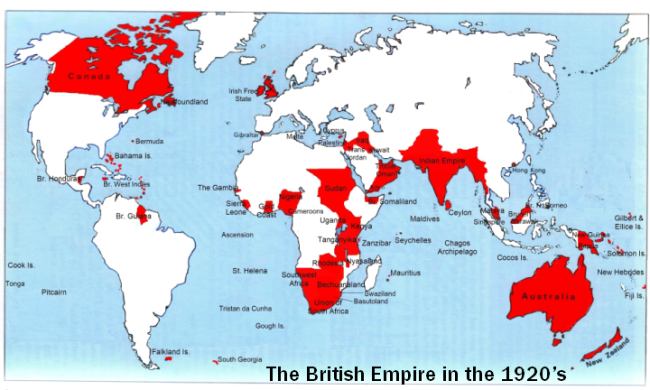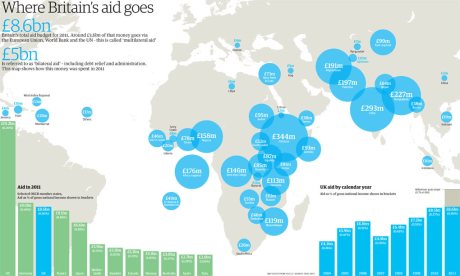In the past, development took place mostly in the form of colonization. Powerful countries, like Britain, would go to their colonies and begin the process of development to better the economies of said colonies. It probably did not hurt that Britain would also benefit economically in the process. Prior to the 1929 Colonial Development Act, assistance was only given to colonies when needed, such as after a natural disaster or crop failure. After the act was enacted, colonial assistance was “given only after a systematic examination of all schemes and projects put forth by the colonial governments,” (Abbott, 1971) which in the end, due to the restrictiveness of the act, did not help the colonies much with bettering their own economies.
But what does this mean for development now? In terms of development, I believe that those countries that used to be colonizers give more money to those countries that were once their colonies than to other recipients. Their special relationship means that former colonizers already have interests in the former colonies and we have to be sure that those interests do not interfere with the country’s development.
Colonization, even with its positive aspects, did, in part, cause the underdevelopment of some societies. As George Abbot brought up in his discussion on the 1929 Colonial Development Act, the act helped Britain more than it did the colonies it was designed for. It reduced the levels of unemployment in the British mainland and stimulated exports, but did not bring many positive impacts to the colonies themselves. Critics even argue that the act, while supposed to be promoting colonial development, actually worked against it, citing reasons like the act was too restrictive and it made broad distinctions that left out important projects, like building schools (Abbott, 1971). So with these reasons in mind, can you tell me how this act was supposed make a difference, when it seems that all it did was restrict the colonies chances of actually receiving aid?
Presently, it is interesting to note that former colonies, such as India and Africa, receive sizable amounts of aid from their former colonizers, in this case, Britain. In 2011, the UK gave £295 million in assistance to India (BBC, 2011). The following graph shows the countries in which UK aid is given. Compare this graph with the map of the British Empire above. Do you notice any similarities?
Aid is focused in India and the Eastern coast of Africa, which in the past, were British colonies.
Whether aid is given either bilaterally or multilaterally, the money often comes with a use for it already attached. Where the money goes is sometimes where the money is not needed, which does not do much in way of helping recipient countries develop. The current aid system often reminds me of colonial era aid with all the hoops that recipient countries have to jump through to receive help.
Robert Fletcher, in his article entitled “The Act of Forgetting: imperialist amnesia and public secrecy,” (2012) cites a perpetual lack of acknowledgement of how colonization and globalization affected currently underdeveloped countries. Fletcher uses a report published by the UN’s Department of Social and Economic Affairs that claims underdeveloped societies are less developed due to “internal obstacles” within the society, such as “ancient philosophies, old social institutions, bonds of cast, creed, and race, and simple lack of motivation,” meaning things such as a society’s culture are to blame for their being underdeveloped. What the UN fails to claim, however, is how colonization has led to this systematic underdevelopment of some societies. The age of colonization and globalization, in part, led to the current distribution of wealth in our society: the gap between wealth and poverty is ever widening, with the rich getting richer and poor becoming poorer, and the UN report is only one example of people conveniently forgetting colonization’s impact on underdeveloped countries.
Not everyone may agree with me, but I think that current aid procedures, and their recipients, is oddly reminiscent of colonial era aid. Many of the same countries are receiving the aid, just now they are not colonies anymore. Does that not strike a chord with anyone else? It is as if the past has been forgotten, but why is there a problem with people forgetting the past? They are bound to repeat it. For example, when I was younger, I would eat so many grilled cheeses (or a toastie if I am going to be British about it) that I would get sick and would not touch another one for months. A few years later, I happened to forget the whole ordeal and it happened all over again!
But on a more serious note, unless aid procedures change, the problems that arose during colonization are bound to occur again. I do not find much of a difference between then and now and I think Western countries, like the UK, should look upon their past with a discerning eye and see where they went wrong and see how they can change so it does not happen again.
(Basically me as a child…)
References:
1. Abbott, George (1971) ‘A Re-Examination of the 1929 Colonial Development Act’, The Economic History Review, New Series, Vol. 24 (1): 68-81
2. http://www.bbc.co.uk/news/magazine-12607537
3. Fletcher, Robert (2012) ‘The Art of Forgetting: imperialist amnesia and public secrecy’, Third World Quarterly, 33:3, 423-439



hi Kat, ( I hope you don’t mind me calling you Kat)
your blog was very interesting as it has humour which made the blog very fun to read. also, I enjoyed the fact that you used simple examples to explain your points as that makes the information on your blog easy to read.
however, your blog would have been excellent if you would have said more on how the past development will affect present development.
wJDaUCCa